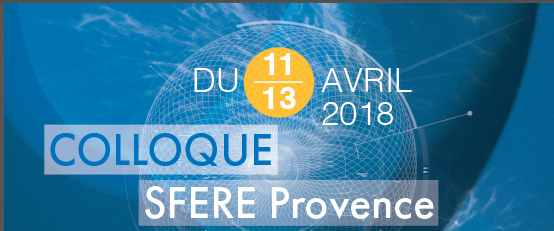Conference Présentation > Themes Theme 1: Language skills and communication Current evolutions regarding the “knowledge-based economy” lead to increased shared information and more diversified contents, types of users, communication tools, intercultural and multilingual exchanges. These evolutions are characterised by communication between individuals from all over the world who need to interact and resolve complex problems. In this context, language and communication skills have never before been so much required (in writing in particular), and research studies focusing on the development of core competencies in literacy are a urgent concern at the European scale (Europe 2020, ISCH COST Action IS1401, ISCH COST Action IS1404). This research topic brings up a global reflection on the development of the adaptive cognitive skills required for reading, writing and communicating remotely, on the plurality of language practices used in writing, whether individual or collective, on the diversity of these practices in educational or professional contexts, and on their potential didactics. It promotes interdisciplinary studies so as to link different research levels while respecting the specificities of the disciplines addressed (psycho-linguistics, language sciences, educational sciences, information and communication sciences, sociology, etc.). It aims at fostering dialogue and convergence of studies that question the development of language and communication skills in a learning perspective. Key words: reading, writing, language practices, remote communication, didactics of writing Keynote Speaker Theme 1:
Theme 2: Uses of the body and education From an anthropological point of view, the body is “man’s first and most natural instrument” (Mauss, 1934/1950, p. 372). It is at the same time a biological anonym object and a constructed object (Canguilhem, 1990/2002). This raises questions about the uses of the body in this twofold dimension. Questions dealing with the uses of the body relate to various disciplines (philosophy, anthropology, history, sociology, psychology, neurosciences). This enables knowledge creation by taking into account different approaches. In this context, the field of education (and training) is emblematic because it contributes to the understanding of the relationships to human body as they have been historically constructed and as they are conducted in educational institutions and among training circles, and more broadly, in the social space. For instance, in the theoretical context of embodied cognition, some authors suggest reconsidering the way we address the question of education by restoring the body’s central role in students’ activities. Other approaches, in the humanities and social sciences, examine the way the body is used in teacher/student and trainer/learner relationships in learning situations (ergonomics of education professionals’ activity, activity phenomenology, professional didactics…). Information from different academic fields will be treated so as to study the uses of the body in a gender perspective, links between body, emotions and affects, the role of the body in the conception of laicism, the place of the body in health education, the question of the body for disabled persons, the uses of the body in arts and physical and sporting activities… What research and reflections have been conducted on these issues? What answers do they provide to the educational world? What are the goals, the methodologies, the results and the limits of these studies? What benefits can we expect from this comparative approach? Key words: body, activity, learnings, teaching function Keynote Speaker Theme 2: Manlio Iofrida Conference video
Theme 3: Territories, trajectories and mobility The analysis of academic trajectories receives great attention in France and at an international level, as reflected, for example, by the increased number of quantitative data on this topic (investigation by the Evaluation, Forecasting, and Performance Department (DEPP), generational investigation, panelisation bias of PISA data in some countries, etc.). Longitudinal, qualitative and quantitative analyses are useful for highlighting how complex academic paths are and for showing a certain number of inequalities. In addition, logics of competition and mobility (or non-mobility) are being increasingly studied on a comparative basis that differentiates educational spaces and segments within a country and/or between several countries (Ballatore, 2010; Felouzis, Maroy, Van zanten, 2013; Courty, 2014; Pasquali, 2014). These studies reveal new problems, which relate to competition initiated between institutions by the European joined up public policies that are not without effect on the growing burden of social heritage in the trajectories of people involved, as well as on the renewed spatialisation of inequalities in terms of educational resources between territories. Within the French education system, these inequalities in terms of trajectories, social and migration backgrounds have been proven. The school system currently struggles to offer all students access to equal conditions for school achievement (CNESCO report, 2016). Socio-economic situations of territories, their history and their characteristics then have a direct or indirect impact on youth educational trajectory. Surroundings affect not only students’ academic success, but also their aims in life. Depending on the place in which they attend school, students follow different academic paths, have different educational aspirations as well as a different relationship with the concept of mobility. When did the situation start changing? Since when have inequalities persisted or decreased? Why and in which political contexts? Education policies, school dropout and its background, past and current school migration/mobility, the burden of social background but also on- and off-the-job training and employment of recent graduates are all the topics that will be discussed under this research heading, on a comparative basis between different countries. The goal is to use different disciplines (economics, sociology, political and educational sciences, history and geography mainly) to reflect on these questions by putting research on students’ educational trajectories (from primary to tertiary education) in perspective. Key words: mobility/trajectories, educational policies, inequalities Keynote speaker Theme 3: Tarek Mostafa Conference video
Theme 4: Creativity and innovation Key words: pedagogical innovations, innovative space, learning environment, (co-)design, uses Keynote speakerTheme 4: Christopher Dede Conference video
|


